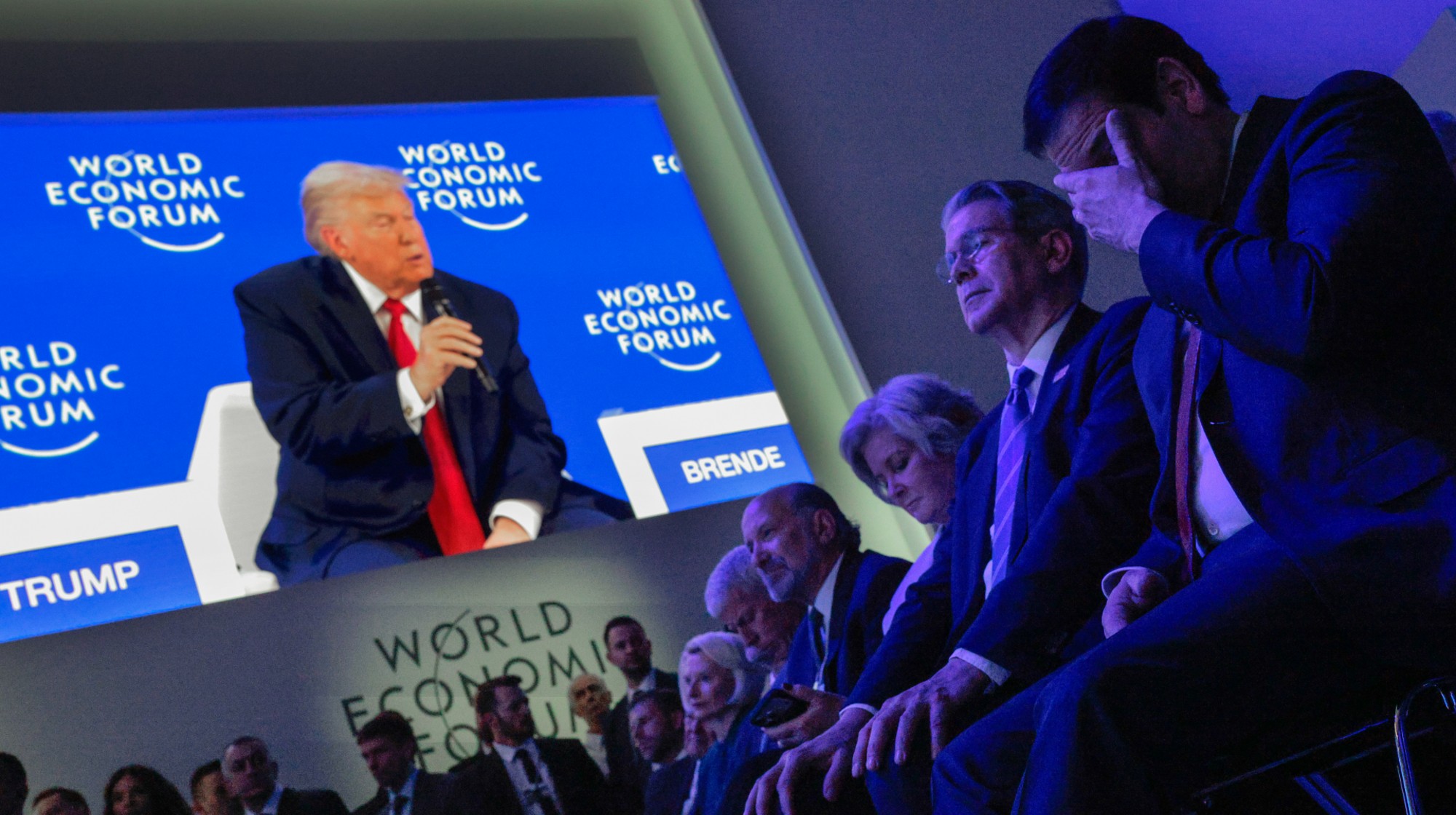What will happen in 2025? Predictions and events
The new year could bring further chaos in the Middle East and an intensifying AI arms race – all under the shadow of a second Donald Trump presidency

A free daily email with the biggest news stories of the day – and the best features from TheWeek.com
You are now subscribed
Your newsletter sign-up was successful
Here's a little merriment for Christmas: a lot of people didn't think this year was the worst they could remember.
Only 65% of respondents to the Ipsos Predictions Survey 2025, a 33-country study, said they thought 2024 was a bad year for their country: the lowest figure since 2019. Despite record levels of conflict, high inflation and cost-of-living crises, it seems that 2024 left the world "in a state of cautious optimism", with the Paris Olympics providing a "fleeting moment of shared celebration".
A higher number, 71%, said they were optimistic 2025 would be even better, but this ratio was below pre-pandemic levels. Israel's bombardment of Gaza and war with Hamas, which escalated into an all-out confrontation with Hezbollah in Lebanon and Iran – as well as the ongoing war in Ukraine – contributed to this "sense of unease". Political upheaval and the unseating of 80% of incumbents in democracies "further fuelled this uncertainty".
The Week
Escape your echo chamber. Get the facts behind the news, plus analysis from multiple perspectives.

Sign up for The Week's Free Newsletters
From our morning news briefing to a weekly Good News Newsletter, get the best of The Week delivered directly to your inbox.
From our morning news briefing to a weekly Good News Newsletter, get the best of The Week delivered directly to your inbox.
Economics
The economy is beginning to stabilise after the pandemic, and most countries have largely got a handle on rampant inflation. But economics will still play an "outsized role in politics" next year, said public policy professor Thomas Klassen on The Conversation. The International Monetary Fund is predicting "stable yet underwhelming" growth, but even stable conditions can "generate political fallout". And economic dangers "lurk" on the horizon.
There's the coming trade war between the US and countries like China, and possibly with the EU, as well as Donald Trump's threats of destructive tariffs on Canada and Mexico. The price of Bitcoin has also more than doubled in the past year and "the trouble with bubbles is that when they burst, recessions or depressions often follow".
America's "inordinately large share" of the world's financial markets remains "the mother of all bubbles", said the Financial Times contributing editor Ruchir Sharma. The fact that "virtually every Wall Street analyst" predicts US stock will keep outperforming the rest of the world suggests that the bubble is "at a very advanced stage". But at the late stages of a bubble, prices "typically go parabolic", like US stock prices over the past six months. "All the classic signs of extreme prices, valuations and sentiment suggest the end is near. It's time to bet against 'American exceptionalism'."
Politics
If 2024 was the Year of Democracy, the biggest election year in history, then 2025 at least looks like a less hectic schedule.
A free daily email with the biggest news stories of the day – and the best features from TheWeek.com
But there will be bellwether elections on three continents, in Australia, Canada and Germany. The latter in Europe's biggest economy is the big one to watch. Chancellor Olaf Scholz just lost a historic vote of no confidence following the collapse of his governing coalition in November, which triggered rare early elections. The situation comes at a time of "deep economic crisis and geopolitical uncertainty" for Germany, said The Guardian.
The result could be a strengthening of the far right as politicians fight to "lure voters who are disgruntled over the cost of living crisis and stagnation over Ukraine". There is also a debate about whether Syrian refugees should now be "urged to return", and calls from the conservative opposition and far-right Alternative for Germany for a "radical rethink on asylum policy".
Trump 2.0
The repercussions of Trump's reelection will "affect everything from immigration and defence to economics and trade", said Tom Standage, editor of The Economist's World Ahead 2025.
His "America First" isolationism will "have friends and foes alike questioning the solidity of America's alliances", which could lead to "heightened tensions and even nuclear proliferation".
Trump has claimed he will end the war between Ukraine and Russia, and help secure a ceasefire between Israel and Hamas to bring an end to the bombardment of Gaza. But his unpredictability and his threats of a trade war could exacerbate existing geopolitical tensions and alienate former allies.
America's "transactional stance" will "encourage troublemaking" by China, Russia, Iran and North Korea – the "quartet of chaos". It is "unclear whether America would stand up to China in a conflict over Taiwan".
Middle East
This will "remain the world's hotspot", said Klassen, with its "confluence of authoritarianism, nationalism, religion and superpower involvement". The recent fall of the Assad regime in Syria will "probably increase instability" in the region. Libya, in particular, could bear the brunt of the "stunning collapse" of Assad's regime, said Frederic Wehrey, senior fellow in the Middle East Program at the Carnegie Endowment for International Peace. Assad's downfall has changed the strategic positions of the two regional powers, Russia and Turkey, and could affect the "fragile equilibrium" between the two in Libya.
In Syria, the Hayat Tahrir al-Sham group that toppled Assad can "talk the talk", saying what Washington and Europe "want to hear", Dana Stroul, a former senior Defense Department official, told NBC News. In 2025, they will have to "walk the walk".
After five decades of brutal, dictatorial rule, the Syrian people "stand at a moment of history – and a moment of opportunity", UN Secretary-General António Guterres said earlier this month. "That opportunity cannot be missed."
Technology
On a brighter note, 2025 has been designated the year of quantum science and technology by the UN.
Artificial intelligence is "the biggest gamble in business history", said Standage: more than $1 trillion is being spent on data centres to underpin the rapidly expanding technology – "even though companies are still not sure how to use it and adoption rates are low". Will investors lose their nerve, or will AI prove its worth?
Whatever happens, the AI arms race is "upending companies, industries, and the way people live and work", said Quartz. The "next frontier" of AI is in "agentic capabilities", said Sissie Hsiao, vice president and general manager of Gemini app and Speech at Google. Consumers will start seeing AI assistants "evolve beyond simple conveniences and into true, personalised, advanced experiences that you rely on every day".
Harriet Marsden is a senior staff writer and podcast panellist for The Week, covering world news and writing the weekly Global Digest newsletter. Before joining the site in 2023, she was a freelance journalist for seven years, working for The Guardian, The Times and The Independent among others, and regularly appearing on radio shows. In 2021, she was awarded the “journalist-at-large” fellowship by the Local Trust charity, and spent a year travelling independently to some of England’s most deprived areas to write about community activism. She has a master’s in international journalism from City University, and has also worked in Bolivia, Colombia and Spain.
-
 El Paso airspace closure tied to FAA-Pentagon standoff
El Paso airspace closure tied to FAA-Pentagon standoffSpeed Read The closure in the Texas border city stemmed from disagreements between the Federal Aviation Administration and Pentagon officials over drone-related tests
-
 Political cartoons for February 12
Political cartoons for February 12Cartoons Thursday's political cartoons include a Pam Bondi performance, Ghislaine Maxwell on tour, and ICE detention facilities
-
 Arcadia: Tom Stoppard’s ‘masterpiece’ makes a ‘triumphant’ return
Arcadia: Tom Stoppard’s ‘masterpiece’ makes a ‘triumphant’ returnThe Week Recommends Carrie Cracknell’s revival at the Old Vic ‘grips like a thriller’
-
 Which way will Trump go on Iran?
Which way will Trump go on Iran?Today’s Big Question Diplomatic talks set to be held in Turkey on Friday, but failure to reach an agreement could have ‘terrible’ global ramifications
-
 Syria’s Kurds: abandoned by their US ally
Syria’s Kurds: abandoned by their US allyTalking Point Ahmed al-Sharaa’s lightning offensive against Syrian Kurdistan belies his promise to respect the country’s ethnic minorities
-
 Grok in the crosshairs as EU launches deepfake porn probe
Grok in the crosshairs as EU launches deepfake porn probeIN THE SPOTLIGHT The European Union has officially begun investigating Elon Musk’s proprietary AI, as regulators zero in on Grok’s porn problem and its impact continent-wide
-
 Israel retrieves final hostage’s body from Gaza
Israel retrieves final hostage’s body from GazaSpeed Read The 24-year-old police officer was killed during the initial Hamas attack
-
 Ukraine, US and Russia: do rare trilateral talks mean peace is possible?
Ukraine, US and Russia: do rare trilateral talks mean peace is possible?Rush to meet signals potential agreement but scepticism of Russian motives remain
-
 Syria’s Islamic State problem
Syria’s Islamic State problemIn The Spotlight Fragile security in prison camps leads to escape of IS fighters
-
 Trump backs off Greenland threats, declares ‘deal’
Trump backs off Greenland threats, declares ‘deal’Speed Read Trump and NATO have ‘formed the framework for a future deal,’ the president claimed
-
 Iran in flames: will the regime be toppled?
Iran in flames: will the regime be toppled?In Depth The moral case for removing the ayatollahs is clear, but what a post-regime Iran would look like is anything but